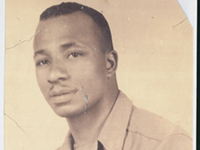| Luther E. Hall |

Luther Hall at time of service | World War II, 1939-1946
Army
C Company, 370th Infantry Regiment, 92nd Division
European Theater
Indianapolis, IN
 |
|
 |
Luther Hall was drafted in February 1941 and was already a sergeant at Fort Huachuca when all the elements of the 92nd Division assembled there in late 1943. He describes several dismaying incidents of prejudice that took place when the Division went on maneuvers in the South. In Italy, the company kept losing commanders to enemy fire, and Hall was briefly put in charge at one point. One of his assignments was to keep tabs on the casualties; because replacements arrived during the night, he sometimes saw a soldier for the first time when he was already dead. He tolerated men going AWOL for a few days at a time to clear their heads, as long as they understood that time missed was time they wouldn't be paid.
|
|

